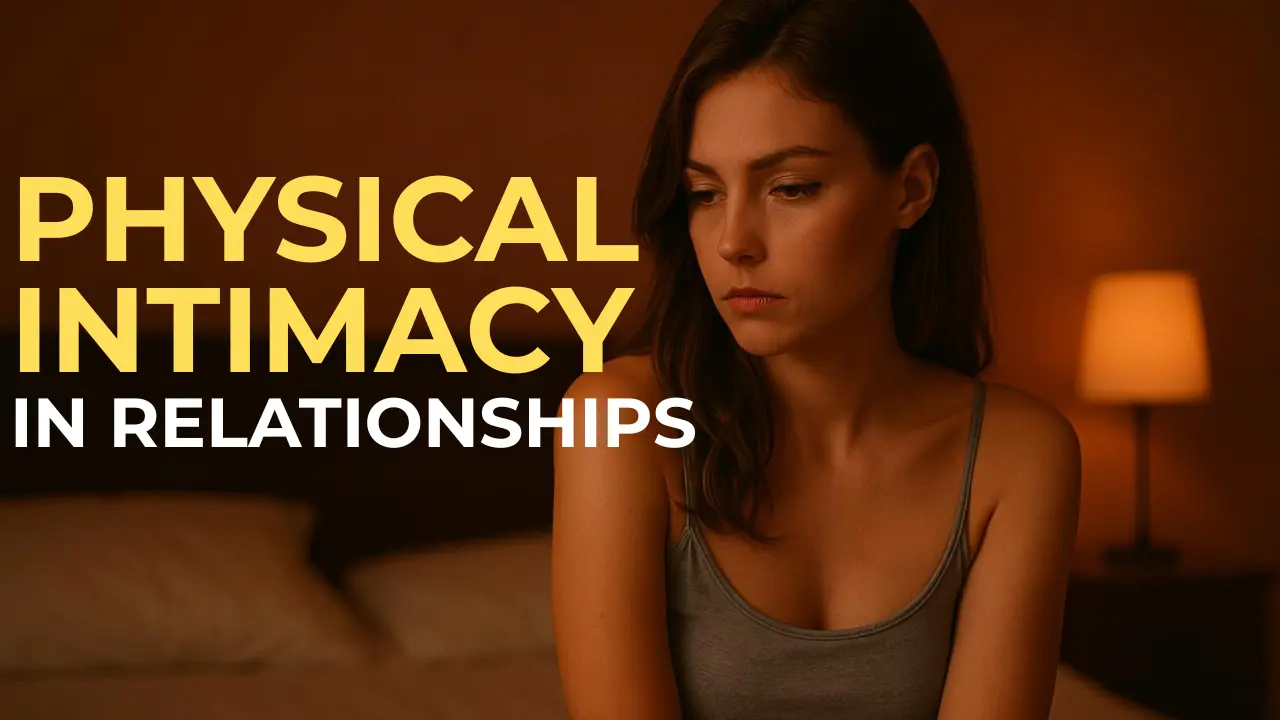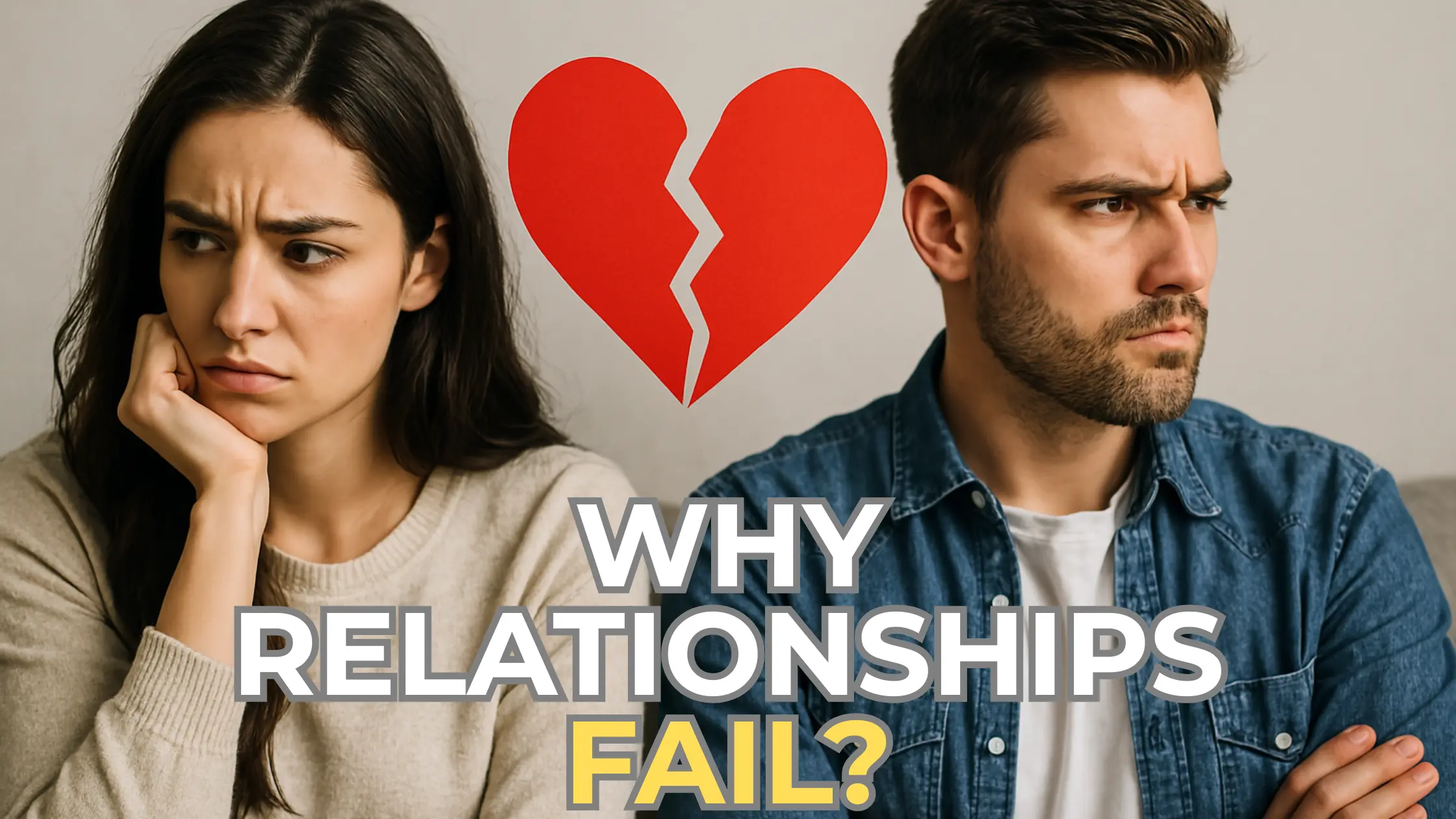In an age of swipe-right culture and immediate satisfaction, relationships seem to start faster—and end even faster. According to recent studies, nearly 50% of romantic partnerships won’t make it past the two-year mark. But why? Why relationships fail? Is love becoming obsolete—or are we just misreading the manual?
I have not written this blog to lecture anyone. It’s a reality check: an open and heartfelt dive into the real reasons why relationships fall apart. Whether you’re in the early glow of romance or deep into a long-term partnership, understanding these problems can help you navigate with more clarity and intention.
Because love isn’t just a feeling—it’s a skill. And like any skill, it demands awareness, effort, and the courage to grow. So let’s uncover why relationships fail—and how you can avoid becoming just another breakup story.
Top 10 Reasons Why Relationships Fail
1. Why Relationships Fail? – Lack of Communication
The Reality: Conversations become transactional—“What’s for dinner?” replaces “How are you feeling?” Partners stop checking in, assuming the other will just know what’s wrong.
Why it Happens: Life gets loud. Work stress, routines, distractions. Vulnerability takes a backseat, and silence becomes the default.
Emotional Fallout: Misunderstandings snowball into resentment. Emotional walls build. Intimacy erodes. Suddenly, you’re living with a stranger.
What Can Help: Relearn the art of listening. Schedule “emotional check-ins” weekly. Prioritize open-ended questions and undistracted presence. Talking is connection’s oxygen—don’t starve the relationship.
2. Why Relationships Fail? – Infidelity
The Reality: It’s not always about sex. Sometimes it’s emotional—long DMs, secret connections, or rekindling with an ex. Trust is shattered, and everything else breaks with it.
Why it Happens: Emotional neglect, unmet needs, or simply opportunity and impulse. But often, it’s a symptom, not the disease.
Emotional Fallout: Betrayal cuts deep. Rebuilding trust feels impossible. The cheated partner often struggles with self-worth, while the other wrestles with guilt or justification.
What Can Help: Radical honesty. If something’s missing, speak up before seeking it elsewhere. And if infidelity happens, own it completely—and commit to therapy, transparency, and time.
3. Why Relationships Fail? – Trust Issues
The Reality: Constant phone-checking. Doubts about motives. Suspicion around every text. When trust is shaky, every interaction feels like a test.
Why it Happens: Past betrayals, childhood wounds, or repeated broken promises. Sometimes, it’s self-doubt projected outward.
Emotional Fallout: Paranoia replaces peace. The relationship becomes a courtroom instead of a sanctuary. Intimacy suffers.
What Can Help: Consistency builds trust. So do boundaries, vulnerability, and owning your behavior. Trust isn’t built by demanding it—it’s earned by being trustworthy.
4. Why Relationships Fail? – Financial Problems
The Reality: Arguments over spending. Secrets around credit cards. Resentment over who earns more—or who spends more. Money becomes a proxy for power.
Why it Happens: Differing values around saving, spending, or financial planning. Lack of transparency. Stress.
Emotional Fallout: Power imbalances. Shame. Silent wars over lifestyle choices. It often bleeds into intimacy and respect.
What Can Help: Budget together. Be radically honest about debt, income, and goals. Approach finances as a team—not as opponents in a fiscal tug-of-war.
5. Why Relationships Fail? – Jealousy and Insecurity
The Reality: “Who were you texting?” “Why didn’t you invite me?” These questions come not from curiosity—but fear. And they don’t stop.
Why it Happens: Low self-esteem. Previous betrayals. Comparison culture amplified by social media.
Emotional Fallout: Control issues emerge. Freedom shrinks. The relationship becomes a surveillance state instead of a safe space.
What Can Help: Insecurity is an internal job. Self-work, therapy, and affirmations go a long way. For couples—create security through daily reassurance, openness, and affirming each other’s value.
6. Why Relationships Fail? – Lack of Quality Time
The Reality: You’re in the same room, but miles apart emotionally. Phones in hand. TV on. No real connection. No memories being made.
Why it Happens: Busyness. Children. Stress. We assume the relationship will “hold” without maintenance.
Emotional Fallout: Emotional drift. Feelings of neglect. The excitement fades, and connection withers into convenience.
What Can Help: Schedule intentional time—date nights, tech-free dinners, morning walks. Love needs presence. Quality > quantity.
7. Why Relationships Fail? – Unrealistic Expectations
The Reality: Expecting your partner to be your therapist, best friend, parent, and motivational speaker. Every unmet expectation breeds silent disappointment.
Why it Happens: Media fantasies. Social media highlight reels. Childhood conditioning.
Emotional Fallout: Chronic discontent. Bitterness. Feeling “let down” even when your partner is doing their best.
What Can Help: Swap expectations for agreements. Focus on appreciation over perfection. Relationships thrive on grace—not performance.
8. Why Relationships Fail? – Lack of Intimacy
The Reality: Kisses become pecks. Sex becomes rare—or robotic. Emotional closeness evaporates. You start to feel more like roommates than lovers.
Why it Happens: Stress, resentment, unresolved arguments, or complacency. Physical and emotional intimacy go hand in hand—and both need nurturing.
Emotional Fallout: Detachment. Insecurity. Temptation to seek connection elsewhere.
What Can Help: Prioritize physical touch, open conversations about desires, and emotional bonding rituals (like gratitude sharing or pillow talks). Intimacy is less about frequency and more about intention.

9. Why Relationships Fail? – Compatibility Issues
The Reality: One wants kids, the other doesn’t. One’s a city lover, the other dreams of country life. You love them—but you’re living on different timelines.
Why it Happens: Differences overlooked in the honeymoon phase or ignored under the hope they’ll change.
Emotional Fallout: Friction. Regret. A painful tug-of-war between who you are and who they need you to be.
What Can Help: Compatibility isn’t sameness—it’s harmony. Get brutally honest early. Shared values > shared hobbies.
10. Why Relationships Fail? – Lack of Effort
The Reality: No more “good morning” texts. No more surprises. No more problem-solving—just avoiding. The spark doesn’t die; it just starves.
Why it Happens: Comfort. Complacency. Belief that “if it’s real, it’ll work itself out.”
Emotional Fallout: One or both partners feel unseen, unloved, and ultimately—unwanted.
What Can Help: Love is a verb. Show up, even when it’s hard. Celebrate small wins. Keep dating your partner. Effort isn’t extra—it’s essential.

The Pattern Behind the Problems
Look closely, and a clear pattern emerges: these aren’t 10 separate issues—they’re a domino effect. Poor communication often leads to misunderstandings, which erode trust. Once trust falters, intimacy suffers. Jealousy creeps in. The spark dims. Suddenly, what started as a single crack becomes a deep fracture.
Dr. John Gottman, a renowned relationship psychologist, calls this “negative sentiment override”—a state where partners start interpreting everything their significant other does through a lens of doubt and resentment. It’s not that love vanishes overnight—it’s buried under unspoken needs and unaddressed wounds.
But here’s the good news: the antidote isn’t perfection—it’s self-awareness. Relationships don’t fail because people make mistakes; they fail when partners stop showing up, stop being honest, stop trying. Consistency beats intensity. Emotional maintenance matters more than grand gestures.
Healing and growth come when both people commit—not to never messing up—but to learning, apologizing, and reconnecting. Again and again.
Relationship Breakdown by the Numbers
Even love has metrics—and they speak volumes. Check out what recent studies and surveys reveal:
- 67% of relationships end due to communication issues, making it the most cited reason for breakups.
- 1 in 5 people admit to cheating in a committed relationship (YouGov, 2023).
- 43% of couples say financial stress is a major source of conflict.
- 56% of failed relationships suffered from a lack of quality time (Match.com survey, 2022).
- 70% of couples who work on trust-building early have stronger long-term outcomes (Gottman Institute).

Takeaway: How to Keep Love from Failing
Love doesn’t die on its own—it fades when neglected. The most beautiful relationships aren’t perfect; they’re built by people willing to do the work, especially when it’s uncomfortable.
Every couple faces storms. What matters is whether you both learn how to dance in the rain or let it wash everything away.
Here’s a simple guide to keep the connection strong:
- 💬 Communicate often – even when it’s awkward or hard.
- ❤️ Prioritize each other – especially when life gets chaotic.
- 🔍 Stay curious – about your partner’s world, emotions, and growth.
Because in the end, love doesn’t just survive by chance—it thrives by choice.
Conclusion: So, Why Relationships Fail?
In the end, most relationships don’t fail because of one big blowout—but rather from small, unchecked fractures that spread over time. Poor communication, broken trust, lost intimacy, and lack of effort often form an invisible web that slowly pulls partners apart.
But here’s the truth:
Awareness is the first step to prevention.
By recognizing these patterns, staying emotionally tuned in, and committing to active love—not passive coexistence—couples can course-correct before it’s too late.
According to my years of my experience, Why Relationships fail? It is when partners stop showing up—for each other, for the hard conversations, and for the connection they once built. Stay engaged. Stay honest. Stay in it together.
Call to Action
Now it’s your turn—
Which of these reasons do you think is the most damaging in a relationship?
Have you experienced any of them firsthand? Your story could help someone else navigate the same storm. Drop your thoughts in the comments below.
Don’t stop here. In this thought-provoking video, we dive deep into the reasons modern relationships break so easily.
Whether you’re healing, growing, or just learning, we’ve got more insights to guide your way.
Frequently Asked Questions (FAQs)
Q: What’s the #1 reason most relationships fail?
A: While every relationship is unique, lack of communication consistently tops the list. When couples stop sharing openly and honestly, misunderstandings, assumptions, and emotional distance creep in.
Q: Can a relationship survive infidelity?
A: Yes—but it requires immense effort, honesty, and professional guidance. Rebuilding trust after betrayal is possible, but both partners must be deeply committed to healing and transparency.
Q: Is love enough to keep a relationship alive?
A: Love is essential, but it’s not enough on its own. Relationships also need trust, effort, compatibility, and shared values to thrive long-term.
Q: How do I know if we’re just going through a rough patch or if it’s over?
A: A rough patch still includes communication, respect, and the will to fix things. If those are absent—and patterns persist—it may be more than just a phase.
Q: How can couples prevent common relationship issues?
A: By being proactive instead of reactive. That means regular check-ins, emotional openness, setting shared goals, and staying curious about your partner.
Q: How important is physical intimacy in a relationship?
A: Very. Physical intimacy fosters emotional closeness and connection. When it fades, it often reflects deeper disconnects—so it’s worth addressing, not avoiding.

